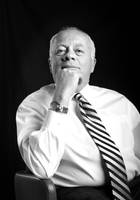
Bruce Spotleson
VEGAS INC Coverage
Business lunches hold a special place on calendars, probably because they enable a person to accomplish several important things in one sitting. You can build relationships, discuss serious matters in a neutral environment and, of course, eat, ensuring survival for at least the afternoon.
Like most of us, I usually sit down to lunch with glee — only to soon be confronted with the difficult choice between the tasty and the healthy.
On this day, I ordered a salad, just as the six other folks at the table had already done.
Because I was eating with insurance and benefits executives, it seemed natural that we would talk about health at some point. I didn’t want to be the only hamburger guy in the crowd.
My lunch companions were the revitalized leadership of Brown & Brown Insurance, a company that recently stepped up its local presence and profile.
On May 16, Brown & Brown merged with Insurcorp, a Nevada health and welfare brokerage and consulting firm led since its inception 20 years ago by Brian Cruden. Previously Insurcorp’s president and CEO, Cruden now serves as regional CEO of the new entity.
Also at the table were David Lester, an insurance veteran who became executive vice president of property and casualty for the new company, and Georges Maalouf, a well-regarded local benefits specialist who merged with Insurcorp last year to create the state’s largest benefits operation. Maalouf is now executive vice president of the new company’s employee benefits division. Michael Paschke, who didn’t join us, is executive vice president.
I asked the trio about the timing of and rationale for the merger.
“They saw this as a strategic move for them,” Cruden said, adding that Brown & Brown, which reached $1 billion in revenue last year, is now the seventh largest insurance brokerage firm in the United States. The merger “takes our company to a new level, one that we believe will create the most powerful all-line insurance brokerage in the state,” he said.
The transition should have a minimal impact on customers and employees.
“It’s a national brand that will continue to embrace local relationships,” Cruden said.
“When Brown & Brown buys something, they leave it alone,” Lester said. “There’s not a lot of micro-management.”
Maalouf added that he liked Brown & Brown’s de-centralized structure.
The economy during the past five years or so was tough on everyone, including those in the benefits industry. Employers wanted to keep coverage without increasing premiums, which required some scrambling by providers.
“We had to get creative,” Cruden said.
Insurcorp did, and its ability to respond to challenges helped it land new clients. The company was managing benefits for about 50,000 people at the time of the merger.
I sipped my iced tea and thought about how earlier in the day, New York City Mayor Michael Bloomberg had proposed a plan to limit the size of sugary beverages sold in the city. My lunch partners said they recognized the motivation behind the plan but didn’t say they agreed with it.
“The two key cost drivers for health care are untreated heart disease and untreated diabetes,” Lester said.
“It comes down to choices and responsibility,” Cruden added.
This reminded Maalouf of the move by some benefits plans a few years back to begin offering free physicals to customers.
“They expected them to multiply, that everyone would do it, everyone would want one,” he said, shaking his head. “But that didn’t happen. People didn’t take advantage of it.”
Cruden said preventive care “slows the trend.”
“People wouldn’t need access to health care systems because they’re healthier,” he said. “It’s wellness and care management,” which would have a positive financial impact.
“It just heads off future costs, like with diabetes,” Maalouf said. “We’re talking about managing the whole person.”
Maalouf noted the difficulty of estimating how much money preventive care saves because you never know exactly what condition you may have prevented.
With that, lunch ended. And I admit, my salad was delicious.
But as I drove back to work, I could almost hear the burger joints calling my name.